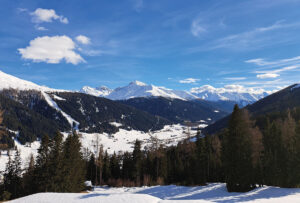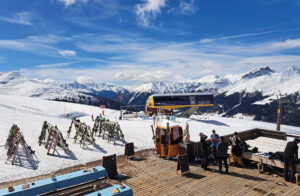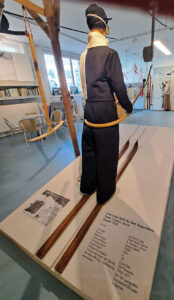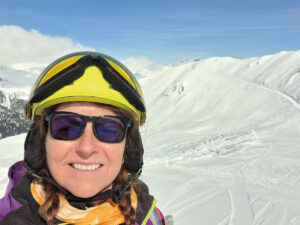 On a trip to Davos, Hils Everitt discovered the resort’s literary links of the past, as well as its place in hosting discussions to combat climate change for the future.
On a trip to Davos, Hils Everitt discovered the resort’s literary links of the past, as well as its place in hosting discussions to combat climate change for the future.
Sir Arthur Conan Doyle is famous for writing the Sherlock Holmes books, but did you know that he introduced Davos as a ski destination to the world?
He, therefore, unconsciously helped in creating an iconic resort that is now known to millions all over the world – even non skiers, as the glamorous World Economic Forum venue.
That event is now closely associated with the important and relevant issue of climate change. This, of course, is a topic very much in the minds of many ski resorts these days as they try to improve their environmental impact, as well as deal with the consequences of warmer temperatures and erratic weather.
This was impressively illustrated on my visit to Davos and neighbouring Klosters in late March last year. We’d skied in the extremes, from total whiteout and blizzards in deep snow on tricky steep blacks in Klosters, to buzzing around the fast, wide, red Davos pistes in blistering hot, glorious sunshine. As well as tackling these extremes, I was also admiring the, at present, redundant snow cannon, with their more environmentally-friendly technology.
When the lifts finally shut it was time to discover more about the resort‘s fascinating history and its literary connections. And Davos is full of them.
My first stop was to be whisked up a funicular train to the Hotel Schatzalp, formerly the town’s famous sanatorium at Weissfluhgipfel. This place put Davos and, subsequently, close neighbour, the more rustic Klosters, on the Alpine map. In those days the thinking was that fresh mountain air was highly beneficial, so the Schatzalp sanatorium had been built to establish the town as a centre for restorative health.
 The view from the terrace is stunning and that alone would improve anyone’s well-being in an instant. It’s a beautiful old building that is now a smart hotel, but does also cater for the more budget conscious with rooms available from SWFR80. Yes, Davos can be done without pots of cash.
The view from the terrace is stunning and that alone would improve anyone’s well-being in an instant. It’s a beautiful old building that is now a smart hotel, but does also cater for the more budget conscious with rooms available from SWFR80. Yes, Davos can be done without pots of cash.
This hotel has anther major, notable connection in that it is the inspiration for a famous novel, ‘The Magic Mountain’ by German author Thomas Mann. The story takes place in an exclusive tuberculosis sanatorium in the Swiss Alps just before the First World War – providing another famous literary connection.
Our own Sir Arthur Conan Doyle’s love of Davos started in 1896 when his wife Louisa fell ill with tuberculosis. Conan Doyle had heard of the sanatorium so took Louisa there and subsequently his sisters. By then Davos had become a popular ski resort for the Swiss, and, as a keen skier, Doyle fell in love with the place.
He wrote about it in an Alpine newspaper and that article led to the Brits embracing the resort. Sir Arthur was also a keen golfer and was the first person to play golf here; he also tackled the famous, but difficult, off piste route to Arosa guided by the Bengen brothers (still a great challenge today); played ice hockey; started toboggan and bobsleigh in Davos; and became great friends with Dr Carl Spengler who built the first hotel, the Curhouse, now Hotel Europe.
 There are a number of other notable firsts. Davos was home to the ski jumper Andreas Dascher who first adopted the drop/fish style where the arms are stretched out behind you, and the first T-bar ski lift in the world was built here opening on Christmas Eve 1934. The Bolgen lift was designed and built by Swiss engineer Ernst Constam Gustav to save skiers hiking up the hill and eating into their lesson time. Davos was also where the modern toboggan was first designed and mass-produced.
There are a number of other notable firsts. Davos was home to the ski jumper Andreas Dascher who first adopted the drop/fish style where the arms are stretched out behind you, and the first T-bar ski lift in the world was built here opening on Christmas Eve 1934. The Bolgen lift was designed and built by Swiss engineer Ernst Constam Gustav to save skiers hiking up the hill and eating into their lesson time. Davos was also where the modern toboggan was first designed and mass-produced.
Conan Doyle’s friend Spengler is honoured by the town by giving his name to the famous Ice Hockey competition. The Spengler Cup celebrated its 100th anniversary in the 2024 season. I was treated to a brilliant night at the ice hockey stadium to watch Davos play in the National play-offs against Lausanne. It was a cracking match – so fast and exciting and you can follow the puck at all times, unlike on TV. I highly recommend it for anyone skiing in Davos during the hockey season.
Climate change has affected the ice hockey team, too. The original ice rink was outdoors, but it had to close in 2016 due to the temperature increasing. This meant it couldn’t be maintained at the correct temperature to be viable. The new indoor facility is superb, but it is sad that there is yet another aspect of this global issue that has significant consequences.
Davos and Klosters are taking this issue incredibly seriously. Davos has a particular need to show its commitment as the host of the World Economic Forum since 1971. The 2024 event, held in January, naturally, included climate change on its agenda.
January is a quieter month on the slopes generally, but the Davos slopes are particularly empty due to the Forum’s presence. That means it is a great time to ski here – if you can book a hotel room early enough, that is. With 50 Heads of State, political/religious leaders and various leading academics, industrialists and the media, plus their entourages descending on the town, I suggest you book early…
• Hils travelled to Davos Klosters courtesy of Switzerland Tourism, via Zurich Airport (Swiss Airlines) then train (approximately 2 ½ hours) direct to Davos.
• To book/plan your journey, visit myswitzerland.com
• Destination Davos Klosters: davos.ch
• A wide variety of accommodation is available in both Davos and Klosters, visit davos.ch & klosters.ch
• Hils stayed at the four-star Grischa – DAS Hotel Davos
• She also visited the highly recommended and fascinating Wintersport Museum.
• For more information about the first ski lift, visit davos.ch/en/information/portrait-image/storybook/first-t-bar-lift
PHOTOS: HJ Everitt
Categories: News, Resort News & Reports, Switzerland

Leave a Reply
You must be logged in to post a comment.